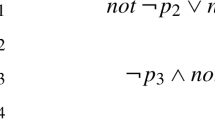Abstract
This paper studies a strong form of disjunctive information in deductive databases. The basic idea is that a disjunctionA ∨B should be considered true only in the case when neitherA norB can be inferred, but the disjunctionA ∨B is true. Under this interpretation, databases may be inconsistent. For those databases that are consistent, it is shown that a unique minimal model exists. We study a fixpoint theory and present a sound and complete proof procedure for query processing in consistent databases. For a class of inconsistent databases, we obtain a declarative semantics by selecting an interpretation that maximizes satisfaction, and minimizes indefiniteness. Two notions of negation are introduced.
Similar content being viewed by others
References
Apt, K. R., Blair, H. A. and Walker, A., ‘Towards a theory of declarative knowledge’ inFoundations of Deductive Databases and Logic Programming (ed. J. Minker), 1988.
Baral, C. and Subrahmanian, V. S., ‘Stable and extension class theory for logic programs and default logics,Journal of Automated Reasoning 8, 345–366 (1992).
Barback, M., Lobo, J. and Lu, J. J., The non-monotonic nature of a class of incomplete information’, inProceedings of the 4th International Conference on Database Theory, Springer, 1992.
Blair, H. A. and Subrahmanian, V. S., ‘Paraconsistent logic programming’,Theoretical Computer Science,68, 135–154 (1989).
Clark, K., ‘Negation as failure’, inLogic and Data Bases (eds. H. Gallaire and J. Minker), Plenum Press, New York, NY, 1978, pp. 293–322.
Gelfond, M. and Lifschitz, V., ‘The stable model semantics for logic programming’, inProceedings of the 5th International Conference on Logic Programming, 1988, pp. 1070–1080.
Gelfond, M. and Lifschitz, V., ‘Logic programs with classical negation’, inProceedings of the 7th International Conference on Logic Programming, 1990, pp. 579–597.
Gottlob, G. and Zicari, R., ‘Closed world databases opened through null values’, inProceedings of the 14th VLDB, 1988, pp. 50–61.
Grant, J. and Subrahmanian, V. S., ‘Reasoning in inconsistent knowledge bases’,Technical Report CS-TR-2532, University of Maryland, 1990.
Kifer, M. and Lozinskii, E., ‘RI: A logic for reasoning with inconsistency’, inIEEE Symposium on Logic in Computer Science, 1989, pp. 253–262.
Kifer, M. and Subrahmanian, V. S., ‘On the expressive power of annotated logics’, inProceedings of the 7th International Conference on Logic Programming, 1990.
Lobo, J., Minker, J. and Rajasekar, A.,Foundations of Disjunctive Logic Programming, MIT Press, 1992.
Lloyd, J. W.,Foundations of Logic Programming, Springer, 1988.
McCarty, L. T. and van der Meyden, R., ‘Indefinite reasoning with definite rules’, inProceedings IJCAI, 1991, 890–896.
Minker, J., ‘On indefinite databases and the closed world assumption’, inProceedings of the 6th International Conference on Automated Deduction, Springer, 1982, pp. 292–308.
Minker, J. and Perlis, D., ‘Applications of protected circumscription’, inProceedings of the 7th International Conference on Automated Deduction, Springer, 1984, pp. 414–425.
Minker, J. and Rajasekar, A., ‘A fixpoint semantics for disjunctive logic programs’,Journal of Logic Programming 9, 45–74 (1990).
Ng, R. and Subrahmanian, V. S., ‘A semantical framework for supporting subjective and conditional probabilities in deductive databases’,Journal of Automated Reasoning 10, 191–235 (1993).
Rajasekar, A., Lobo, J. and Minker, J. ‘Weak generalized closed world assumption’,Journal of Automated Reasoning 5, 293–307 (1989).
Priest, G., ‘Reasoning about truth’,Artificial Intelligence 39, 231–244 (1989).
Read, S.,Relevant Logic, Basil Blackwell, 1989.
Reiter, R., ‘On closed world data bases, inLogic and Data Bases (eds. H. Gallaire and J. Minker), Plenum Press, New York, 1978, pp. 55–76.
Reiter, R., ‘A logic for default reasoning,Artificial Intelligence 13, 81–132 (1980).
Ross, K. A. and Topor, R. W., ‘Inferring negative information from disjunctive databases’,Technical Report, University of Melbourne, 1988.
van Gelder, A., Ross, K. A. and Schlipf, J. S., ‘The well-founded semantics for general logic programs,J. ACM,38(3), 62–650 (1991).
Yahya, A. and Henschen, L. J., ‘Deduction in non-horn databases’,Journal of Automated Reasoning 1, 141–160 (1985).
Author information
Authors and Affiliations
Rights and permissions
About this article
Cite this article
Lu, J.J., Barback, M.D. & Henschen, L.J. Interpreting disjunctive logic programs based on a strong sense of disjunction. J Autom Reasoning 10, 345–370 (1993). https://doi.org/10.1007/BF00881796
Received:
Accepted:
Issue Date:
DOI: https://doi.org/10.1007/BF00881796




